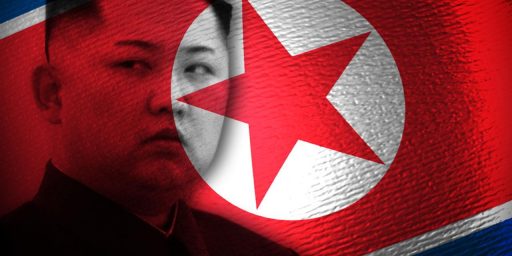U.S. Considering Shootdown of North Korean Missile
There was much blogospheric speculation earlier this week over the possibility of using a DPRK missile test as an opportunity to test our defensive system. Now, AP reports that the administration is seriously considering doing just that.
If North Korea launches a long-range missile, as some U.S. officials say appears likely, then the Pentagon may get a first chance to use its unproven missile defenses against a real target. Although the North Korean missile most likely would be launched for a flight test or to put a satellite in space, Bush administration officials are considering the possibility of shooting it down, since they cannot rule out in advance that the missile might be fired with hostile intent. “The problem is that no one knows because North Korea doesn’t say anything in advance of a test,” said Rick Lehner, chief spokesman for the Pentagon’s Missile Defense Agency. “So you have no idea what it is.”
[…]
David Wright, a senior scientist at the private Union of Concerned Scientists, said he strongly doubts that the Bush administration could back up its claims of having the capability to shoot down a North Korean missile. “I consider it to be rhetorical posturing,” Wright said. “It currently has no demonstrated capability.” The last time the Pentagon registered a successful test in intercepting a mock warhead in flight was in October 2002. Since then there have been three unsuccessful attempted intercepts, mostly recently in February 2005.
Alan Dowd has more on the state of our anti-missile defenses at TCS.




I fully support this first realistic operational test of the GMD system, since there hasn’t been one conducted yet under realistic circumstances. Now the $64 billion question is, what happens if we fail to hit it?
David Wright has been asleep for the past few years if he has not noticed that Bush usually does, or at least tries to do what he says he is going to do. In a poker game, I’ll bet on Bush. If NK fires that missle, and we are not sure what its purpose is, we have both the right and the duty to swat that fly out of the sky. If we have to salvo those interceptors so be it. but knock that threat down. I am suprised, James, that you sound negative on this issure.
I’m not at all surprised that James is negative on the idea of trying to shoot it down. As DC Loser said: “what happens if we fail to hit it?”
There is no possible net gain we can get from trying to shoot it down. Even if we hit it, what do we gain besides more realistic test data for the GMD system? You can expect diplomatic efforts to stop the DPRK’s nuclear program to come to a complete end, and another missile test as soon as they can ready another one, and this time probably deliberately aimed at the US or an ally.
As I commented in the last post about this, a clandestine strike while the missile is fueled and on the launch pad is the best action we can take, though I still think no action would be the better alternative.
Realistic test data is highly valuable in a research environment. If we hit it, it will show that all of our previous tests were more than a Hollywood set up. It will not show that we can hit all countermeasures but will show we can hit most missiles in current inventories.
If we miss it, we can say that the program is in limited status and donâ??t have all the radar and other facilities set in place yet or that we were only testing reaction time and didnâ??t want to increase tension by actually shooting the missile down.
Oh sure, they’ll believe THAT 😉 What part of OPERATIONAL dont’ they understand?
I think there is huge upside if we hit it. Was it a fluke or can we do it again? It lowers the bargaining value of the NK nukes. NK has a bunk of tanks also. Are we worried about them going south of the border. Yes in that we station troops, train for it, etc, but no one seriously worries that the NK could defeat the US/SK in a conventional war. Raise havoc initially as they would get to pick the time and place, absolutely. Win a conventional war, not a chance.
We don’t have that comfort with the nukes. Even if we knock one missile down, we still won’t know for sure, but we will certainly have raised the FUD factor for NK. I suspect that just our announcement had raised their FUD factor.
The AP article also says “Robert Einhorn, a senior adviser at the Center for Strategic and International Studies, said a U.S. shootdown of a North Korean missile on a test flight or a space launch would draw “very strong international reaction” against the United States. He saw only a small chance that the U.S. would attempt a shootdown.”
If the US successfully shoots down a UK missile, some on the left will condemn Bush (if Bush announced a cure for cancer, AIDs and the common cold, some on the left would condemn him). Some countries, like China and Russia, might make pro forma noise, but would likely be interested in knowing that the NK genie may have a stopper to the bottle. Iran would condemn us but we care about that because…? France would likely keep it’s collective trap shut as they have enough trouble at home.
One thing I am not clear on is the competing claims. We have from the left “â??I consider it to be rhetorical posturing,â?? Wright said. â??It currently has no demonstrated capability.â?? The last time the Pentagon registered a successful test in intercepting a mock warhead in flight was in October 2002. Since then there have been three unsuccessful attempted intercepts, mostly recently in February 2005.”
But following the Alan Dowd link, we have “Elsewhere on the high seas, May saw the Navy fire an SM-2 anti-missile missile from the deck of an Aegis cruiser and kill an inbound threat in its terminal phase (the final few seconds of flight). “It was the first sea-based intercept of a ballistic missile in its terminal phase,” according to the Missile Defense Agency (MDA).
Likewise, the MDA scored a land-based success in May, when rocketeers at the White Sands Missile Range in New Mexico test-fired a high-altitude interceptor missile designed to seek out and destroy inbound threats in their final minute of flight.”
This sounds very different than not having a successful test in the last 4 years. Is this just MSM bias that nothing Bush supports can be good so screw the facts, MSM bias that only talks to the left side and doesn’t bother with the right side experts, a simple error on the part of the reporter or bad writing where one kind of missile defense has a bad record those others don’t and the article doesn’t make it clear.
YAJ – The Aegis SM-2 and the THAAD (which shot down the WSMR targets)intercepters were designed to go after short and medium range missiles. ICBM re-entry speeds are much too high to be engaged by theater systems. SM-2 and THAAD are relatively mature systems, like the Patriot PAC-3. The only system that can intercept an ICBM target like TD-2 is the GMD, which got an unprecedented waiver from the DoD to go into operational status without a full Operational Test and Evaluation, which every other DoD weapon system has to undergo. That’s why it’s stated the system has not been fully tested, and probably why it won’t be used in this eventuality because we just don’t know how it would perform, and probably don’t want to know either in case it goes FUBAR.
What does Japan want us to do? They’ve got a lot invested in this as well.
Charles,
Japan is working with the US to set missile defenses. I think they are going on line in 2010. I could be wrong on that date.